At Gamescom, Korean peripheral manufacturer Pulsar showed many upcoming releases slated for 2024 and 2025, some of which had to be flown in overnight fresh out of the factory. Aside from updates to existing mice series such as the Xlite, X2, X2H, or X2A, Pulsar also showed wholly new shapes and concepts.
Pulsar XS-1 sensor and in-house firmware
Shared between all new mouse releases from Pulsar will be improvements to the sensor and firmware. Based on PixArt's latest PAW3950 sensor, the custom XS-1 sensor will be capable of CPI adjustment in increments of 10, which would be restricted to steps of 50 on a regular PAW3950. After two years of development time, Pulsar's own in-house developed firmware is also nearing completion, and will feature multiple improvements over the third-party solution used previously. More specifically, refined double-click prevention will be included, slam-click prevention is implemented, and latency has been lowered further across the board. The firmware change will be accompanied by a new software as well, which will be exclusive to all newer models featuring the XS-1.




Pulsar By You
One of the main novelties shown at Gamescom is Pulsar's mice configuration service called Pulsar By You. Historically, Pulsar has released numerous variants of their mice, often differing from each other only in smaller details, and the reception of these changes often varied depending on people's preferences. With their custom configuration tool, Pulsar is able to provide as many options as possible within the constraints of mass production. The way this works is very straightforward. First, one picks a base model template, such as Xlite, X2, X2H, or X2H. Then, one gets to choose between many main buttons switch types, ranging from the RAESHA optical switches found on the latest X2V2, X2H, X2A, or Xlite V3 models, to mechanical switches such as TTC Gold, Huano Silent switches, and others. Scroll wheel encoder choice is next, including options such Pulsar's own Blue encoder, models such as Kailh Red or TTC Gold, and others. In addition, one can choose between a regular ABS plastic wheel, or the aluminium wheel known from the eS series. From there, the adjustment options are of the aesthetic kind: colors for the main button pieces, main top shell, side button pieces, bottom shell may be chosen, and even non-matching colors between left and right main buttons or forward and back side buttons are possible. Next, the mouse feet type may be determined, with options ranging from regular PTFE skates to Pulsar Superglide glass feet, again in different colors. Cable and wireless extender may be set as well, and even a custom text can be added to the side. Lastly, the 4K wireless dongle for polling rates of up to 4000 Hz in wireless operation may also be added. Aside from select options such as mouse feet choice, wheel material, or the 4K wireless dongle, most modifications are value-neutral, i.e., they do not contribute to the base price of $139.99. The only customization option arguably missing is the coating, though this simultaneously is the most challenging one to realize, though Pulsar is exploring possibilities to add this at a later point.
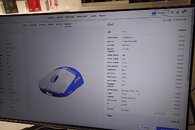
Xlite V4, X2 V3, X2H V3, and X2A V3
Aside from the already mentioned upgrades in the sensor and firmware department, the main novelty of these will be a different main button switch choice, more specifically Kailh optical switches instead of ones from RAESHA. As with previous iterations, these will be available in different sizes (large, medium, small for the Xlite, medium and small for the others) as well as in eS editions, which add 8000 Hz wired polling, an aluminium scroll wheel, and on-device configuration through an OLED screen. In addition, all non-eS editions will receive the eS coating, which has been received more favorably among users. Of note is also that the side buttons of the X2A may be removed.
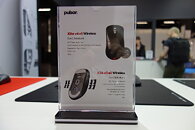

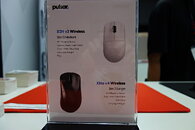
X3 RHD and LHD
While ambidextrous designs are very common, symmetrical designs (side buttons on both sides) such as the X2A are far less common. Even rarer are left-handed ergonomic designs, the last one of which dating back by almost a decade. Closely modeled after the shape of the Logitech G403/G703, the X3 will be offered in both right-handed and left-handed variants, and in two sizes (medium and small).




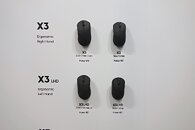
Feinmann F01 Wireless
Named after theoretical physicist Richard Feynmann, Feinmann will be a sub-brand within Pulsar, focused on more experimental or otherwise exotic releases. The first such release will be the F01, whose shell is made out of a magnesium alloy, in order to reach a weight of 46 g. Its size and shape are that of the original Xlite ("Xlite 1.5"), and charging is exclusively done through a charging station, as a USB interface is wholly absent. Final pricing is yet to be determined.


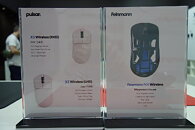
Pulsar Lab
Even more experimental products will be realized within Pulsar Lab, the first of which will be a fingertip-only mouse slated for 2025, utilizing a carbon fiber composite shell, Omron mechanical mouse button switches, and featuring 8000 Hz polling. This will also be the first Pulsar mouse manufactured entirely in Korea.

PCMK 2 HE
Pulsar's first keyboard with analog HE switches, the PCMK 2 HE will feature 8000 Hz polling and a 32,000 Hz scan rate. Of note is the distance adjustment range for Rapid Trigger, which will go down as low as 0.1 mm, and unlike with wooting's offerings, the 0.1 mm option is said to actually be 0.1 mm instead of 0.3-0.4 mm. Theoretically, going even lower than 0.1 mm may be possible, but this may interfere with practicality, as simply bumping the desk could result in actuation. SOCD (short for Simultaneous Opposing Cardinal Directions) will also be supported and may be enabled through a button combination, but be disabled by default. The PCMK 2 HE will be available in both TKL and 60% form factors, along with ANSI, ISO, and JIS layouts.
Part of Pulsar's commitment to esports will also be several partnerships with professional players, including several high-profile names to be revealed at a later point.
View at TechPowerUp Main Site
Pulsar XS-1 sensor and in-house firmware
Shared between all new mouse releases from Pulsar will be improvements to the sensor and firmware. Based on PixArt's latest PAW3950 sensor, the custom XS-1 sensor will be capable of CPI adjustment in increments of 10, which would be restricted to steps of 50 on a regular PAW3950. After two years of development time, Pulsar's own in-house developed firmware is also nearing completion, and will feature multiple improvements over the third-party solution used previously. More specifically, refined double-click prevention will be included, slam-click prevention is implemented, and latency has been lowered further across the board. The firmware change will be accompanied by a new software as well, which will be exclusive to all newer models featuring the XS-1.




Pulsar By You
One of the main novelties shown at Gamescom is Pulsar's mice configuration service called Pulsar By You. Historically, Pulsar has released numerous variants of their mice, often differing from each other only in smaller details, and the reception of these changes often varied depending on people's preferences. With their custom configuration tool, Pulsar is able to provide as many options as possible within the constraints of mass production. The way this works is very straightforward. First, one picks a base model template, such as Xlite, X2, X2H, or X2H. Then, one gets to choose between many main buttons switch types, ranging from the RAESHA optical switches found on the latest X2V2, X2H, X2A, or Xlite V3 models, to mechanical switches such as TTC Gold, Huano Silent switches, and others. Scroll wheel encoder choice is next, including options such Pulsar's own Blue encoder, models such as Kailh Red or TTC Gold, and others. In addition, one can choose between a regular ABS plastic wheel, or the aluminium wheel known from the eS series. From there, the adjustment options are of the aesthetic kind: colors for the main button pieces, main top shell, side button pieces, bottom shell may be chosen, and even non-matching colors between left and right main buttons or forward and back side buttons are possible. Next, the mouse feet type may be determined, with options ranging from regular PTFE skates to Pulsar Superglide glass feet, again in different colors. Cable and wireless extender may be set as well, and even a custom text can be added to the side. Lastly, the 4K wireless dongle for polling rates of up to 4000 Hz in wireless operation may also be added. Aside from select options such as mouse feet choice, wheel material, or the 4K wireless dongle, most modifications are value-neutral, i.e., they do not contribute to the base price of $139.99. The only customization option arguably missing is the coating, though this simultaneously is the most challenging one to realize, though Pulsar is exploring possibilities to add this at a later point.

Xlite V4, X2 V3, X2H V3, and X2A V3
Aside from the already mentioned upgrades in the sensor and firmware department, the main novelty of these will be a different main button switch choice, more specifically Kailh optical switches instead of ones from RAESHA. As with previous iterations, these will be available in different sizes (large, medium, small for the Xlite, medium and small for the others) as well as in eS editions, which add 8000 Hz wired polling, an aluminium scroll wheel, and on-device configuration through an OLED screen. In addition, all non-eS editions will receive the eS coating, which has been received more favorably among users. Of note is also that the side buttons of the X2A may be removed.



X3 RHD and LHD
While ambidextrous designs are very common, symmetrical designs (side buttons on both sides) such as the X2A are far less common. Even rarer are left-handed ergonomic designs, the last one of which dating back by almost a decade. Closely modeled after the shape of the Logitech G403/G703, the X3 will be offered in both right-handed and left-handed variants, and in two sizes (medium and small).





Feinmann F01 Wireless
Named after theoretical physicist Richard Feynmann, Feinmann will be a sub-brand within Pulsar, focused on more experimental or otherwise exotic releases. The first such release will be the F01, whose shell is made out of a magnesium alloy, in order to reach a weight of 46 g. Its size and shape are that of the original Xlite ("Xlite 1.5"), and charging is exclusively done through a charging station, as a USB interface is wholly absent. Final pricing is yet to be determined.



Pulsar Lab
Even more experimental products will be realized within Pulsar Lab, the first of which will be a fingertip-only mouse slated for 2025, utilizing a carbon fiber composite shell, Omron mechanical mouse button switches, and featuring 8000 Hz polling. This will also be the first Pulsar mouse manufactured entirely in Korea.

PCMK 2 HE
Pulsar's first keyboard with analog HE switches, the PCMK 2 HE will feature 8000 Hz polling and a 32,000 Hz scan rate. Of note is the distance adjustment range for Rapid Trigger, which will go down as low as 0.1 mm, and unlike with wooting's offerings, the 0.1 mm option is said to actually be 0.1 mm instead of 0.3-0.4 mm. Theoretically, going even lower than 0.1 mm may be possible, but this may interfere with practicality, as simply bumping the desk could result in actuation. SOCD (short for Simultaneous Opposing Cardinal Directions) will also be supported and may be enabled through a button combination, but be disabled by default. The PCMK 2 HE will be available in both TKL and 60% form factors, along with ANSI, ISO, and JIS layouts.
Part of Pulsar's commitment to esports will also be several partnerships with professional players, including several high-profile names to be revealed at a later point.
View at TechPowerUp Main Site






